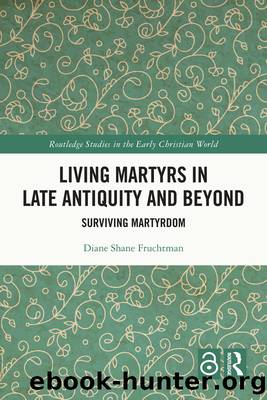Living Martyrs in Late Antiquity and Beyond by Diane Shane Fruchtman;

Author:Diane Shane Fruchtman; [Fruchtman;, Diane Shane]
Language: eng
Format: epub
ISBN: 9781032261065
Publisher: TaylorFrancis
Published: 2022-06-11T00:00:00+00:00
By explicitly mentioning that living as fortunate ones or âFelixesâ is in imitation of the saintâs name, Paulinus is calling attention to the wordplay. But in the context of the passage, in which Felix âfloodsâ his followers while the font of Christ âsprings up withinâ them, the message of identification is clear: we can become Felixes, too; and like Felix, we can merge with the divine. Similarly, we see the appellation doing double duty as a name and an adjective in the Natalicium of 406. Paulinus here recounts the repentance of a visitor to the shrine, who had absconded with the meat from the pig he had sacrificed to Felix only to be struck down on his homeward journey by a Felix-sent fall from his horse. Acknowledging his own former failures, the once-greedy man admits: âFor myself, I, wretched, deserve such punishment / here in this hall where, if anyone wretched should come into it, / he is made felix!â57 The rest of the repentant manâs speech is about transformation from being a sinful man with a sound body to a cleansed man with a broken body and about how that healing happens through Felix and at his shrine: the transition from miser to felix is a transformation both of mental state and of identity.58
With all of these exhortations to and encouragements toward imitation, Paulinus creates and cultivates an ethic of imitation that he intends to govern the spiritual worldview of contemporary Christians. This is the same sort of mentality that we saw with Prudentiusâs martyrial worldview and in Georgia Frankâs notion of biblical realism. But in this instance, the âopportunity to participate in the biblical pastâ59 is afforded not by a re-interpretation of the self but by a commitment to imitating what is imitable in the saints. For Paulinus, that category included, above all else, an interior reorientation to govern behavior in the here and now, an interior imitation capable of manifesting itself in multiple earthly forms. Paulinus was expanding the range of patterns that constitute martyrdom. This mirrors the multiplication of mimesis that Candida Moss identifies in earlier Christian material.60 According to Moss, this means that âadditional layers to the mimetic economy are added so that each successive generation of martyrs models their conduct on that of their predecessors.â61 What I have shown, by contrast, is that the multiplication Paulinus sought was not one delimited by enumerated varieties of conduct but one centered on orientation with limitless possible manifestations.62
Download
This site does not store any files on its server. We only index and link to content provided by other sites. Please contact the content providers to delete copyright contents if any and email us, we'll remove relevant links or contents immediately.
| Central Africa | East Africa |
| North Africa | Southern Africa |
| West Africa | Algeria |
| Egypt | Ethiopia |
| Kenya | Nigeria |
| South Africa | Sudan |
| Zimbabwe |
Goodbye Paradise(3455)
Men at Arms by Terry Pratchett(2685)
Tobruk by Peter Fitzsimons(2376)
Arabs by Eugene Rogan(2196)
Pirate Alley by Terry McKnight(2128)
Borders by unknow(2119)
Belonging by Unknown(1732)
It's Our Turn to Eat by Michela Wrong(1593)
The Biafra Story by Frederick Forsyth(1560)
Botswana--Culture Smart! by Michael Main(1484)
The Source by James A. Michener(1459)
A Winter in Arabia by Freya Stark(1447)
Gandhi by Ramachandra Guha(1432)
Coffee: From Bean to Barista by Robert W. Thurston(1420)
Livingstone by Tim Jeal(1394)
The Falls by Unknown(1372)
The Shield and The Sword by Ernle Bradford(1312)
Africa: Altered States, Ordinary Miracles by Richard Dowden(1296)
Egyptian Mythology A Fascinating Guide to Understanding the Gods, Goddesses, Monsters, and Mortals (Greek Mythology - Norse Mythology - Egyptian Mythology) by Matt Clayton(1278)
